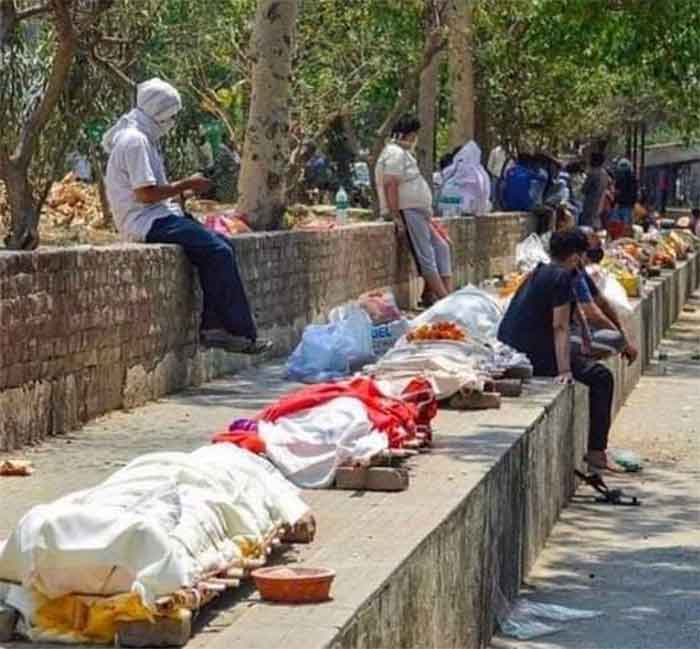Co-Written by Amit Kumar and Puja Pal

Originating from Wuhan, China, the novel Corona Virus has affected most of the countries across the continents. Due to its world-wide spread WHO declared it as “pandemic” on March 11. Since the outbreak of COVID-19, around 1,523,898 people around the world have been infected and some 88,956 people have died in at least 201 countries (WHO). India the second most populous country of the world, slowly engulfing into the most recent deadly crisis. As per the official estimates, the active number of cases in India have crossed 5000 and 178 deaths due to the COVID-19 has been reported. According to ILO, coronavirus pandemic is not only worst global health crisis but will result into major labour market and economic crisis.
PM Narendra Modi in his second address to the nation on 24th March, announced that the whole country will be on lockdown for the next 21 days. Again, there are reports coming that due to increasing number coronavirus cases the lockdown may further extend. Thus, it is pertinent to access the implication of nationwide lockdown on livelihood of the rural people in economy. The paper looks at the impact of lockdown on the economic activity and livelihood in Mohcha ka Pura a village located in the Sawai Madhopur district of Rajasthan. The following information is collected through the telephonic conversation with 3 farmers, 1 driver and 2 shop owners.
According to 2011 census, there are 334 households in the village with total population of 1785. There are only two castes in the village, majority of the households are from Scheduled Caste (SC) (namely Jatavs) with population more than 76 percent while the rest belong to the Scheduled Tribe (ST) and all of them are Meena.
The main occupation of the residents are farming, agricultural labour, construction work and salaried jobs. There are also some people who are running the small shops in their homes (groceries and vegetables). Some of the people migrate to Jaipur, Noida, Gurugram and Punjab to work in construction and Bricklin sites.
The caste divide is clearly visible in the village, most (almost 90 %) of the households in the Meena caste have one or more members in the salaried jobs while this number is less than 20 % for the SC households. So, the impact of lockdown will be different on both of these castes. However, the Meena’s will also face losses from the fact they are not able to sell their crops.
The main Rabi crops of the village are wheat, mustard and gram. The harvesting of mustard has already been done before the lockdown was announced and many of them have sold their crops but some of them kept it in their homes. After lockdown they are facing the problem of sending the crops to the mandis. The wheat and gram have been harvested this week but the farmers are not able to transport their produce to the market. This was possible as the farmers uses the family members and workers from the village only. Most of these farmer’s income and their survival depends on the incomes from these crops which has been stalled now.
Also, the nearest mandi (in Hindaun) which is around 21km is in the Karauli district. But the mandi has been closed down due to the 1 reported positive cases of Corona Virus in Karauli. There has been no announcement form the government on how their crop will reach to the market. For the time being there is no shortage of animal feed as the crop has been recently harvested and residual is available. But if the lockdown extends for longer period this will also create shortage for the animal feed in near future.
The next crop in the village will be pearl millet, sesame and groundnut once the monsoon arrives. Till then these farmers depend on the income from the rabi harvest which they have not received yet.
The non-farm employment has also come to standstill as the material for the construction activities can not be transported. This is also the time when villagers used to work for under the MNREGS, but this time they wont be able to get any work due to lockdown. So the announcement by the government to increase the wage rate does not make sense if there is no work.
While talking to one of the truck(small) driver, he said that his truck has been standing since the lockdown. And he is worried about what is going to happen as he has to pay monthly instalment of Rs 13500 monthly against the loan he has taken. He used to take the harvest from the villages to the mandis.
The people have not received their BPL ration yet, they have complaint many times to the authorities and they are being told that they will receive it in the coming week. But at the same time the prices of the necessary goods have increased drastically. The prices (per kg) of potato increased from Rs 25 to Rs 50, onion prices increased from Rs 40 to Rs 60, prices of tomato from Rs 30 to Rs 40. The prices of Moon daal has increased from Rs 85 to 120 and that of Urad daal from Rs 90 to 120.
It has become very difficult for the shop owner to procure supplies from the market as the markets are open for few hours only. One of the shop owners has to shut his shop because he doesn’t have a private vehicle to go and buy supplies.
Against the grim situation, people in the village are content that received the first instalment from PM-KISAN and the money has also been credited to their Jhan dhan account. But the nearest bank is almost 7 km from the village and residents are finding it difficult to withdraw their money. Further, the village has been sanitised with the help of Panchayat. Police comes once in a day to make sure lockdown is implemented.
In sum, farmers are facing difficulties in selling their crops to mandis and in absence of non-farm employment and MNREGA work the income of people have dried up. Further, adding to their problem the prices of essential goods have increased drastically. Soon, people will face shortage of animal feed too. But receiving first instalment from PM-KISAN and Jan Dhan has given them some ray of hope. So, if government decides to further extend the lockdown due to climbing of the coronavirus cases, then it will be going to be challenging one.
[1] Amit Kumar is a research scholar at Centre for Economic Studies and Planning (CESP), JNU, New Delhi.
[2] Puja Pal is a research scholar at Centre for Economic Studies and Planning (CESP), JNU, New Delhi.
SIGN UP FOR COUNTERCURRENTS DAILY NEWS LETTER
















































